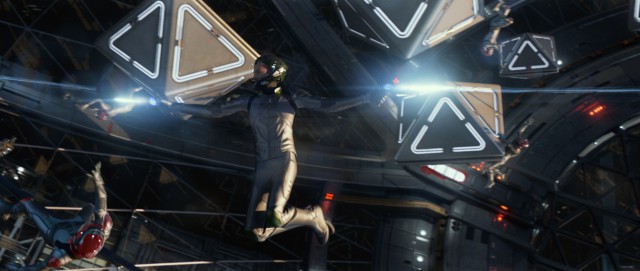
Glam it up all you want: Ender’s Game is about a kid playing a high-stakes video game. And before Fred Savage-fueled the visions of The Wizard go Super- Mario-dancing in your head, you should know this features absolutely no Power Glove love.
Based on a beloved book by awful homophobe and terrible human being Orson Scott Card, Ender’s Game is about how bad/good war is, how noble/irrelevant compassion is and how important/meaningless individuality is. If there was a clear message in the book beyond “kids can play video games like whoa,” screenwriter/director Gavin Hood lost it in adaptation. The result is a tepid, vanilla, special-effects bonanza with no stakes that squanders Harrison Ford’s attempt to kind of give a damn for once.
Asa Butterfield is the titular Ender Wiggin, a brilliant boy trained to command military action against aliens from a young age. As is always the case, smart children in fiction are played as emotionally stunted and devoid of true personality, so Butterfield isn’t given much to do when his voice isn’t cracking while belting out commands. Colonel Graff (Ford) is convinced that the insect-like aliens are going to return to Earth and treat us like we treat actual insects, so he rushes Ender through the training program in the hopes of turning the tide once and for all. This all leads to a climactic battle that takes place in what is basically the holodeck from Star Trek’s Enterprise, the Danger Room from X-Men or the dreamatorium from NBC’s Community.
More talented actresses Abigail Breslin and Hailee Steinfeld are forced to play “Go get ’em, male-hero-guy!” roles because Card’s brain is the kind of place where having female genitals fully eliminates independent heroism. Their characters exist solely to help Ender reach his objective. Worse yet is Major Gwen Anderson (Viola Davis), whose job it is to whine about hurt feelings and fragile emotions to Colonel “My name even looks like gruff ” Graff.
In the hands of a more gifted artist than Hood, the adaptation may have focused on modern extrapolations of the book’s themes. For example, the detached, robotic military equipment that kills enemies while its users are safe far, far away certainly mirrors the current hubbub over U.S. drone strikes. Likewise, the stale “coming of age too young in the face of war” theme that has been present since movies first grew to prominence in the wake of World War II could have been replaced by an examination of the intellectual and revolutionary power of youth (see The Arab Spring, for example). Instead, Ender just plays with a fancy X-Box, and Hood hopes you’re distracted enough.
Ender’s Game is perfectly serviceable, wholly inoffensive and spectacularly average entertainment. The saddest part is that Ford appeared to have actually woken up for a scene or two, but Hood was seemingly unprepared for that possibility, so nothing much comes of it. Nothing much comes of any of this really, save for Card getting another chance to cling to relevance and advance his agenda of hate. So, maybe this was a bad idea.
— This review first appeared in The Reader of Omaha, Neb.
Rating: Two out of four stars
Respond: [email protected]














